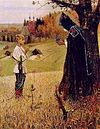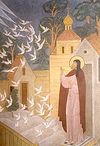

| Previous day | Next day |
| Old Style
July 5
|
Tuesday |
New Style
July 18
|
| 7th Week after Pentecost. Tone 5. | No fast.
|
![]() St. Athanasius of Mt. Athos and his six disciples (1000).
St. Athanasius of Mt. Athos and his six disciples (1000). ![]() Uncovering of the relics of St. Sergius of Radonezh (1422).
Uncovering of the relics of St. Sergius of Radonezh (1422).
Martyr Anna, at Rome (304). St. Lampadus, monk, of Irenopolis (10th c.). Sts. Athanasius and Theodosius, of Cherepovets (both ca. 1388), disciples of St. Sergius of Radonezh.
![]() New Martyrs Abbess Elizabeth (Romanova) and Nun Barbara, and those with them: John, Igor, Constantine, Sergius, and Vladimir, princes, and Theodore, at Alapaevsk (1918). New Hieromartyr Aristarchus (Sitalo), archimandrite, of Akhtyra (1919). New Confessor Agapitus (Taube), monk of Optina Monastery (1936).
New Martyrs Abbess Elizabeth (Romanova) and Nun Barbara, and those with them: John, Igor, Constantine, Sergius, and Vladimir, princes, and Theodore, at Alapaevsk (1918). New Hieromartyr Aristarchus (Sitalo), archimandrite, of Akhtyra (1919). New Confessor Agapitus (Taube), monk of Optina Monastery (1936).
Hieromartyr Stephen, bishop of Rhegium, disciple of Apostle Paul, and with him Bishop Suerus and the women Agnes, Felicitas, and Perpetua (1st c.). Hieromartyr Athanasius, deacon, of Jerusalem (451). St. Morwenna, patroness of Morwenstow (England) (6th c.). New Martyr Cyprian of Koutloumousiou, Mt. Athos (1679). Synaxis of 23 Saints of Lesbos.
Thoughts for Each Day of the Year
According to the Daily Church Readings from the Word of God
By St. Theophan the Recluse

Tuesday. [I Cor. 6:20-7:12; Matt. 14:1-13]
A rumour of the works of the Lord reached Herod; he immediately concluded: it is John resurrected. One could have thought anything. Yet he did not think of anyone except John. Who gave such a direction to his thoughts? His conscience. From it you cannot hide unconscionable deeds; you cannot correct its judgement with anything. Herod assumed the right to behead John, and others did not deny that he had the right, but his conscience spoke, and he could not muffle its words with anything. That is why he immediately saw John. How many similar instances do we know where the conscience pursues a sinner and paints the subject and deed of a sin so that he sees them even outside himself! There is a voice in us that we must acknowledge is not our voice. Whose is it? God’s. He who gives us our nature, gives us this voice. If it is God’s voice, we must obey it, for creatures dare not contradict the Creator. This voice says that God exists, that we completely depend upon Him, and therefore we cannot not but have a reverent fear of God; having this fear, we must fulfil God’s will, which conscience indicates. All of this makes up the word of God, written in our nature, read and offered to us. And we see that people of all times and all countries hear this word and heed it. Everywhere people believe in God, everywhere they listen to their conscience and await the future life. Only now has it somehow become fashionable to not acknowledge these truths. This is how the naturalists behave; which means that the teaching which the naturalists preach is unnatural.
Articles
 The Heart of a SaintSophie Law“I took up the life I am now leading not as a cross—but as a road full of light God showed me after Serge’s death and which years and years before had begun in my soul." |















